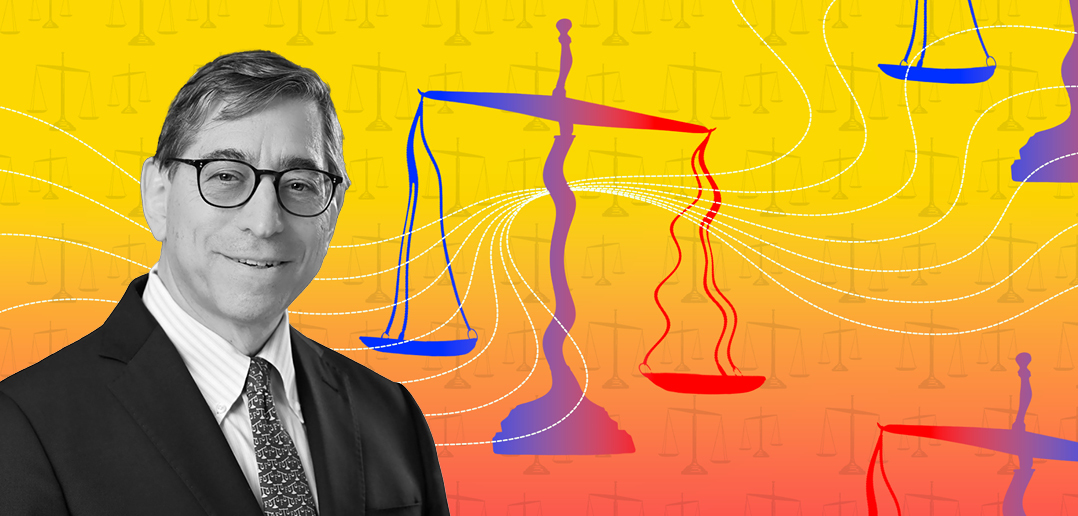Bruce Green, the Louis Stein Chair and director of the Louis Stein Center for Law and Ethics, is an expert on the legal profession and lawyers’ professional responsibility as well as criminal law and procedure. A former federal prosecutor, he is a prolific and frequently-cited scholar. Much of his scholarship explores the professional responsibilities of criminal prosecutors, including prosecutorial independence and protections against political influence.
What legal subject are you currently working on?
From the time I came to Fordham in 1987, I have been writing about the role, responsibilities and challenges of criminal prosecutors. I have been fortunate to find co-authors who share my passion for this subject, which bridges criminal procedure and the legal profession. My scholarship draws on my experience as a federal prosecutor in the Southern District of New York before coming to Fordham, my part-time work with the Iran/Contra independent counsel, Lawrence Walsh, and my work in the ABA Criminal Justice Section beginning in 2010. Recently, I’ve been looking at prosecutorial independence, specifically prosecutors’ ethical responsibility to be politically nonpartisan and to avoid and be protected from the influence or pressure of partisan actors. I’ve also been examining the related question of how to preserve public confidence in prosecutors’ nonpartisanship.
How does your focus on prosecutorial independence impact people and/or the legal community?
The public should have confidence that public officials are acting for the right reasons—based on the facts and the law, not political preferences. Just as we care about the legitimacy of judges, we care about the legitimacy of prosecutors, who are equally important to protecting and preserving the rule of law. When the public thinks, rightly or wrongly, that prosecutors are engaged in political “witch hunts” or in political favoritism, it is bad for both the public and for prosecutors. So prosecutors need to be concerned about both the reality and the appearance of nonpartisanship.
Why is this scholarship important?
Recently, politicians on both sides of the political aisle have fostered the public perception that prosecutors are making important decisions that are politically motivated. Sometimes the accusations deserve to be taken seriously, because they are leveled by prosecutors or former prosecutors who were on the inside, as in the case of various prosecutors in the Department of Justice under Attorney General Bill Barr’s leadership. In other cases, cries of “weaponization” seem like just so much rhetoric. Either way, prosecutors need to think about how to preserve public confidence, and legislatures, including Congress, need to consider what further structures need to be implemented to prevent partisan politics from influencing prosecutors’ work or appearing to do so. This is a concern throughout the world, and not just in our country. My co-author and I want to contribute to this important public policy question.
What have you learned about this topic that people may not realize?
I’ve learned that there are some really hard questions, and they have no easy or settled answers—and those are the questions that need scholarly attention, and not just from me. For example, prosecutors cannot avoid cases, such as public corruption cases, that have political implications. When making decisions in these cases, such as whether to initiate charges, should prosecutors ignore the political implications? Or should they consider the possible political impact—for example, that an indictment will be politically disruptive or may influence an election or that it may foster mistrust of the prosecutors’ office? Judge Walsh wrestled with this dilemma in the Iran/Contra prosecution more than three decades ago, and Special Counsel Jack Smith has had to wrestle with it recently. And what should prosecutors do when they are given directions from above that they believe are improperly politically motivated? Some prosecutors in the Trump administration who believed they faced such situations followed superiors’ directions while others quit the case, quit their jobs, or defied the directions. I’m not sure which response is best or whether there are further alternatives.
Will you be presenting this scholarship in an article, book, or talk?
A piece on prosecutors’ independence, written in collaboration with my longtime co-author Prof. Rebecca Roiphe at New York Law School, will be published as a chapter of a book, The Sociology of Legal Ethics, and an essay that we are co-authoring on prosecutors’ legitimacy will be included in a forthcoming colloquium collection of the Fordham Law Review. Other work is at an earlier stage.
How does your scholarship in this area relate to your teaching?
For more than 30 years, I have taught a three-credit seminar on Ethics in Criminal Advocacy, which focuses on the work of prosecutors and criminal defense lawyers. The course materials are my own and I update them every summer. My scholarship on prosecutors’ work frequently builds on the seminar’s readings and discussions and, at the same time, the readings reflect my scholarly preoccupations. When I pose questions on which I am currently working, my students become my scholarly collaborators, whether they know it or not. It’s an extraordinary privilege to be able to teach what I write about, and to write about what I teach. I hope my students benefit as much as I do!

